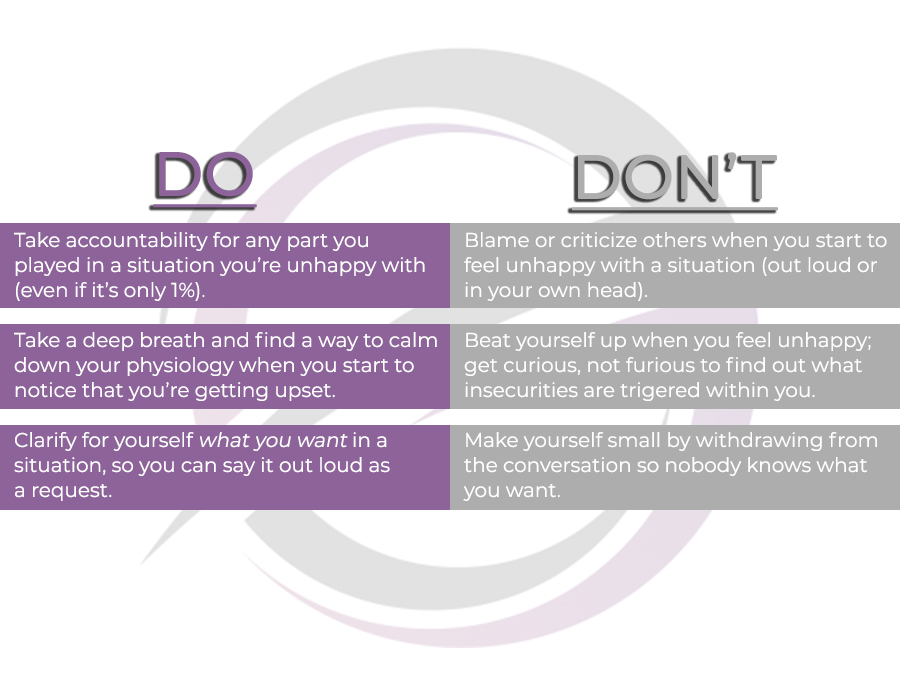You’ve just finished another useless conversation with your boss. “Why do I even bother with these 1:1’s??” you think to yourself, feeling yourself quietly fuming.
But what are you going to do? Tell your boss that these 1:1 conversations are a waste of time, and you end up feeling even more disengaged because you can see he’s actively multi-tasking while you’re asking him to help you move blockers and help you hit your goals? “He’s happy to keep raising the goals, but does he do a damn thing to help my team hit them? Nope!”
Obviously you can’t have that conversation. It doesn’t fit with how you see yourself. You are a good worker, a team player, a go-getter. You don’t want to be seen as a complainer, and you certainly can’t tell off your boss.
But you do complain. At home, to your husband and your friends. And you do tell your boss off – in your head as you daydream about what it would be like to really unload.
And all of this energy keeps you in a negative space, so then you find yourself getting down on yourself about being in a negative space. OMG. Sound familiar?
We’ve all been there at one time or another. In fact, research has shown that half of workers in the U.S. have left their jobs when they’re actually leaving their managers.
And yes, some bosses are more effective than others, so sometimes quitting will allow people to have a better relationship with a new boss.
But before you decide to quit – get really honest with yourself and ask yourself 3 key questions:
- In what situations do I give my power away?
- In those situations, what insecurities are triggered within me?
- If I loved and honored myself fully, how would I handle these conversations differently?

Giving your power away
All of us give our power away sometimes. You do this when you allow somebody to “push your buttons” and even the expression on their face can steal your joy or rain on your parade.
You give your power away when hours or even days after the conversation has ended, you’re still playing the conversation in your head over and over, feeling the anger well up in you again and again. You give your power away when you have thoughts in your head that you want to say out loud, but you bite your tongue and stay quiet, convincing yourself that withholding is the best thing you can do in the moment.
This list goes on and on.
Any time you find yourself feeling critical of others, blaming them for your own dissatisfaction with a situation, or you’re behaving like a victim, feeling stuck as though there’s nothing else you can do – you’re giving your power away.
And you’re doing this because holding onto your power means allowing yourself to feel from the Inside Out. What happens when you stop blaming and playing the victim?
Blame is the most common defense mechanism in organizations. And it is by far and away the biggest waste of time.
“All blame is a waste of time. The only thing blame does is to keep the focus off you when you are looking for external reasons to explain your unhappiness or frustration.”
Wayne Dyer
Nothing shifts in yourself if you don’t let yourself feel what you’re feeling. Now you’re wondering: “What am I supposed to feel? I feel all the time – I feel pissed!”
Get curious, not furious.
Get curious, not furious. Share on XWhat insecurities are triggered in me?
So, what are you supposed to feel? Those feelings that you do feel – frustrated, angry, maybe even furious – those are defensive reactions that prevent you from feeling what’s underneath. Underneath anger, frustration, even irritation – is fear and insecurity. A simple way to capture this is: What bugs me about you is really about me.
What bugs me about you is really about me. Share on XWe all have insecurities, primarily because we are all imperfect humans who were raised by other imperfect humans. The fear that you’re not _____ enough can be so painful, that your brain’s immune system kicks in and prevents you from actually feeling the fear.
So when your boss is clearly multi-tasking during your 1:1 Zoom meeting, instead of allowing yourself to recognize that this triggers your fears of not being important enough to have his full attention, your defense system kicks in, and decides instead that your boss is a jerk who is also incompetent. After all, if an incompetent jerk doesn’t regard you as important enough to respect you, it’s not so painful, right? It would be far more painful if you saw your boss as a competent, kind (and imperfect) leader who just didn’t give you the time of day.
Pay attention to the insecurities that are triggered within you. The Fundamental Interpersonal Relations Orientation (FIRO) theory asserts that all humans want to feel significant, competent, and likable. When you don’t feel as significant, competent, and likable as you want to feel, your defensiveness stops you from feeling your own fears of your inadequacies and deflects pain by blaming other people or the world.
This brings you temporary relief, so if you keep doing it, then you get to keep avoiding feeling the pain. But you also keep having the crappy situations where you get triggered and give your power away.
And maybe you decide it’s just this job, or just this boss, so you quit – and you go somewhere new. But unless you actually let yourself feel what is within you, you will find that these patterns continue to show up for you. In your work life, your personal life, with friends, family, kids.
Are you ready to make a change?
How can I handle these conversations differently?
So how do you make a change? And do you really have to be the one to change? I mean – maybe your boss really is a jerk.
Yes, maybe your (imperfect) boss makes mistakes and doesn’t always treat you like you want to be treated. But what if your boss isn’t “a jerk” at his core?
What if there are specific things that you can do differently so that you can feel differently?
There are. I promise.
Now, it is skill based, so it doesn’t happen overnight. If anybody wants to tell you that you can flip a switch and immediately learn how to hold onto your power in hard conversations, they are full of it.
You (probably) wouldn’t pick up a bow and arrow to do archery for the first time and expect to hit the bullseye 10 times in a row, right?
Navigating hard conversations and changing the relationship with “challenging” people is the same way. There is knowledge to be gained (mostly about yourself) and skills to be practiced that can transform how you feel and how effective you are.
For now, I’ll leave you with 3 do’s and 3 don’ts for changing the relationship you have with your boss – so that next time YOU are the one who gets promoted.

If you’re ready to go deeper and grow as a leader from the Inside Out, invest in yourself by joining Insider Edge. You can become a member for free!
Ready to take your leadership to the next level? Get your FREE copy of my eBook, Level Up: 3 Steps to Be a Better Leader. Click here to download!


One reply on “Mad You Didn’t Get Promoted? Here’s How You Can Crush It Next Time”
Awesome article post.Really looking forward to read more. Really Great.